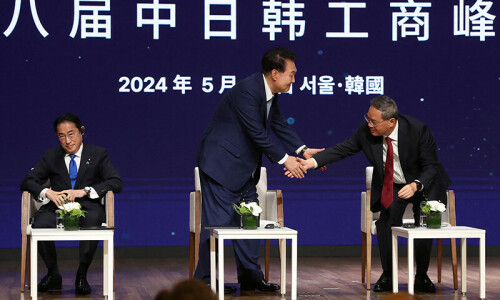BAGHDAD, Feb 10: United Nations representatives have achieved a breakthrough in their talks with the Iraqi government on the oil-for-food programme, the director of the UN office of the Iraq programme said in Baghdad on Sunday.
Benon Sevan called for more efficient handling of aid to Iraqis in need.
“I think we have achieved a breakthrough today, and for this reason I am pleased to be able to report that I am returning satisfied,” Sevan said after four weeks of talks with various Iraqi ministries.
Sevan said he hoped the UN sanctions committee in New York would soon put forward proposals for more effective processing of the Iraqi applications “to end the current impasse”.
The committee is tasked with approving all Iraqi imports under the oil-for-food programme.
Baghdad has repeatedly complained that its applications are often not processed for months and that delivery of urgently needed supplies is deliberately delayed.
The Oil Ministry alone had put forward applications worth some 500 million dollars for spare parts and other equipment, Sevan said.
The UN oil-for-food programme allows Iraq to export oil and use the proceeds to import medicines, food and certain other goods with the aim of mitigating the effects of UN sanctions on the Iraqi population.
CAMPAIGN:The administration of US President George W. Bush is engaged in a major Iraq policy review that may result in massive military action against the government of Iraqi President Saddam Hussein, The Los Angeles Times reported on Sunday.
The administration expects to complete this long-delayed Iraq policy review by the time Vice President Richard Cheney makes his Middle East tour next month, so that he can outline American plans to Arab leaders, the daily said, citing senior US officials.
The emerging new Iraq policy is based on two premises, according to the report.
First, the Iraq problem has to be solved, not simply managed as it was during the previous US administrations.
Second, Washington is prepared to push beyond the limitations imposed by international sentiment, Arab public opinion and even the original UN resolutions that opened the way for Operation Desert Storm 11 years ago, The Times said.
According to the report, policymakers are considering three basic scenarios.
A diplomatic option calls for working through the United Nations to pass new “smart sanctions” and press Saddam to allow the return of UN arms inspectors ejected from Iraq in 1998.
Also under consideration is a military campaign, probably relying heavily on air power and potential defections within the Iraqi military, the paper said.
The administration may also opt for tightening the political noose around Baghdad’s neck with more coercive actions by neighbouring states and the international community, according to the report.—AFP













































Dear visitor, the comments section is undergoing an overhaul and will return soon.